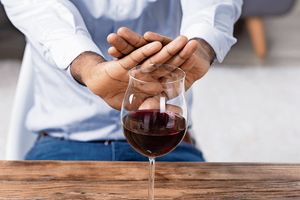
Alcoholism kills the soul before the body.
For years, alcohol was their comfort, escape, and silent shame. But when the laughter at home faded and trust began to erode, these fathers faced a hard truth—and made the life-altering choice to quit drinking for the sake of their families. Their stories reveal the hidden courage it takes to say “no more” in a society where male vulnerability is often masked by bravado.
Andrew Mwangi, 30, first tasted alcohol in 2012, just after finishing high school. A passionate aspiring journalist, he failed to gain admission to his dream college and instead worked as a matatu tout in Kitengela. With his earnings, he trained as a DJ—but it was in the Nairobi nightlife that his drinking began.
“Friends encouraged me. Soon, I was drinking heavily. My mother kicked me out. I lost my job,” he tells Lifestyle.
He moved to Namanga to start a boutique business, but cheap alcohol across the Kenya-Tanzania border proved too tempting. “A bottle that costs Sh300 here was Sh80 there. I couldn’t manage the business. I lost everything.”
At his worst, Andrew stole a gate worth Sh10,000 from his mother’s compound, and sold it for Sh3,000 to buy alcohol. His mother eventually arranged for him to be admitted to rehab—without his knowledge.
But recovery wasn’t linear. After rehab, he relapsed within two days. “I’d drink after every meal. My first wife left me. I even stole from strangers.”

Andrew Mwangi, a recovered alcoholic.
His mother tried everything. She even flew him to Dubai to live with a friend, hoping a change of scenery would help. But true change came in 2022, when he met his current wife, Joan Khayaiwa.
“She got pregnant, and I didn’t want to lose her and my baby,” Andrew says. “I quit drinking and replaced alcohol with tea. Joan stood by me when no one else did.”
Andrew’s last drink was on June 2, 2024. Now, he avoids old friends and focuses on being a better father. “My daughter is my motivation. I never want her to live the life I was living.”
A better father
Willy Mwangi began drinking in high school in 2007, influenced by peers. As years passed, alcohol consumed every part of his life.
“I couldn’t even buy food or pay rent. Every coin I got went to alcohol. I couldn’t keep a job,” he says.
Eventually, his family gave up on him. “They said I was a burden. I got into fights, stole to buy drinks. My own family didn’t want to see me.”
Things worsened when he moved to Nairobi. His parents, fearing for his life, admitted him to rehab in Nakuru in 2019.
Recovery was difficult. “I had nightmares, insomnia, restlessness. I relapsed three times. But my father’s support and the lessons from rehab helped me hang on.”
Willy eventually lost a business—a mini-mart in Nairobi’s Pipeline—because of drinking. But everything changed with the birth of his daughter. “I wanted to raise a good child. I wanted to be a better husband to my wife, Victoria. That’s why I quit.”

Willy Mwangi is a father of one from Naivasha who recovered from alcohol.
Since 2022, Willy has remained sober. He’s now seen as a role model in his community.
“Parents ask me to speak to their children about quitting. I feel like I finally have a purpose.”
According to addiction counsellor Julie Ndung’u, many men fall into alcoholism as a way to cope with deep emotional wounds.
“Male alcohol addiction often stems from unaddressed pain and egos bruised by life’s hardships,” says Ms Ndung’u, who works in Lari, Kiambu County.
She explains that while men may initially drink out of curiosity, the addiction grows in environments that lack emotional support.
“When we ignore their pain, they find comfort in alcohol and friends who don’t judge them.”
Ms Ndung’u highlights that alcoholism in fathers affects entire families—especially children.

Julie Ndung'u is an Addiction Counsellor based in Kiambu County.
“Alcohol causes financial strain, leading to fights and emotional trauma. Children feel isolated and carry those wounds into adulthood.”
But recovery is possible—with family support.
“Spouses shouldn’t condemn or mock their addicted partners. Encouragement and non-judgmental support go a long way,” she says. “And older children can help their fathers by showing love and support, not shame.”
For full recovery, Ms Ndung’u recommends structured rehab, follow-up integration programmes, and family therapy. She also encourages replacing drinking habits with positive activities and cutting off friends who enable relapse.
“Guilt is common, but it can be healthy. It motivates healing,” she notes. “With commitment, community, and love, recovery is always possible.”
She recalls one former alcoholic who started his own rehab center to help others after getting clean—proof that even the most broken stories can end in purpose.
“Alcoholism kills the soul before the body,” Willy says. “But recovery brings back life, love, and dignity. I know that now.”






